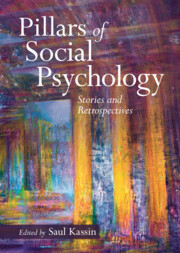Book contents
- Pillars of Social Psychology
- Pillars of Social Psychology
- Copyright page
- Contents
- Contributors
- 1 Introducing the Pillars of Social Psychology
- 2 Seven Decades in Social Psychology
- 3 A Career Emerging from an Unnecessary Analysis
- 4 Once a Social Psychologist, Always a Social Psychologist
- 5 Abe and Leon and Me
- 6 My Contributions to Social Psychology Over Many Decades
- 7 Influences and Dissonances
- 8 From Ideomotor Theory to the IAT in Just 35 Years
- 9 Curiosity
- 10 The Emergence and Evolution of Social Realities
- 11 The Good Old Days
- 12 “What Ever Happened to that Blond Girl?”
- 13 A Quest for Social Psychology That Spans the Psychological and the Social
- 14 Reasoning
- 15 Chance and Choice
- 16 Looking Back on a Charmed Career
- 17 My Train Ride to Social Psychology
- 18 The Making and Remaking of a Cross-Cultural Psychologist in Six Acts
- 19 A Professional Past of Arranging to Be Compelled
- 20 A Social Psychological and Personality Approach to Human Motivation
- 21 Wandering into Psychology and Law
- 22 My Meandering Journey into Social Psychology
- 23 A Career in Ten Episodes
- 24 Getting Lucky
- 25 Mindsets
- 26 Social Psychology and Me
- 27 My Life as a Social Psychologist
- 28 You Can’t Be a Self by Yourself
- 29 Getting to Here from There
- 30 A Relational Life
- 31 Planning Is Overrated
- 32 Symptoms, Secrets, Writing, and Words
- 33 How Chance Encounters Can Foster a Career
- 34 A Multi-Decade Journey between the Lab and the Real World
- 35 A Long and Winding Road
- 36 Tales of a Devoted but Disillusioned Party Crasher
- 37 Social Cognition, Always the Great Beyond
- 38 The Accidental Social Psychologist
- 39 The Power of Firmly Held Beliefs
- 40 My Career in Social Psychology
- 41 Chasing Self-Esteem
- 42 The Basement Tapes
- 43 Evolutionary Social Psychology
- 44 One Man’s Search for (the Assignment of) Meaning
- 45 Meetings with Remarkable Men: A Fortunate Journey in Social Psychology
- 46 Dear Vera, Chuck, and Dave
- 47 Always Buy the Handbook of Social Psychology (1968) at a Railway Station in India
- 48 Empowering People to Break the Prejudice Habit
- 49 Seeking the Middle Way
- 50 The Pillars, Their Stories, Retrospectives, and Signals Loud and Clear
- Index
- References
3 - A Career Emerging from an Unnecessary Analysis
Published online by Cambridge University Press: 29 September 2022
- Pillars of Social Psychology
- Pillars of Social Psychology
- Copyright page
- Contents
- Contributors
- 1 Introducing the Pillars of Social Psychology
- 2 Seven Decades in Social Psychology
- 3 A Career Emerging from an Unnecessary Analysis
- 4 Once a Social Psychologist, Always a Social Psychologist
- 5 Abe and Leon and Me
- 6 My Contributions to Social Psychology Over Many Decades
- 7 Influences and Dissonances
- 8 From Ideomotor Theory to the IAT in Just 35 Years
- 9 Curiosity
- 10 The Emergence and Evolution of Social Realities
- 11 The Good Old Days
- 12 “What Ever Happened to that Blond Girl?”
- 13 A Quest for Social Psychology That Spans the Psychological and the Social
- 14 Reasoning
- 15 Chance and Choice
- 16 Looking Back on a Charmed Career
- 17 My Train Ride to Social Psychology
- 18 The Making and Remaking of a Cross-Cultural Psychologist in Six Acts
- 19 A Professional Past of Arranging to Be Compelled
- 20 A Social Psychological and Personality Approach to Human Motivation
- 21 Wandering into Psychology and Law
- 22 My Meandering Journey into Social Psychology
- 23 A Career in Ten Episodes
- 24 Getting Lucky
- 25 Mindsets
- 26 Social Psychology and Me
- 27 My Life as a Social Psychologist
- 28 You Can’t Be a Self by Yourself
- 29 Getting to Here from There
- 30 A Relational Life
- 31 Planning Is Overrated
- 32 Symptoms, Secrets, Writing, and Words
- 33 How Chance Encounters Can Foster a Career
- 34 A Multi-Decade Journey between the Lab and the Real World
- 35 A Long and Winding Road
- 36 Tales of a Devoted but Disillusioned Party Crasher
- 37 Social Cognition, Always the Great Beyond
- 38 The Accidental Social Psychologist
- 39 The Power of Firmly Held Beliefs
- 40 My Career in Social Psychology
- 41 Chasing Self-Esteem
- 42 The Basement Tapes
- 43 Evolutionary Social Psychology
- 44 One Man’s Search for (the Assignment of) Meaning
- 45 Meetings with Remarkable Men: A Fortunate Journey in Social Psychology
- 46 Dear Vera, Chuck, and Dave
- 47 Always Buy the Handbook of Social Psychology (1968) at a Railway Station in India
- 48 Empowering People to Break the Prejudice Habit
- 49 Seeking the Middle Way
- 50 The Pillars, Their Stories, Retrospectives, and Signals Loud and Clear
- Index
- References
Summary
I retired a couple of years ago as a kid in my mid-80s. But I hadn’t stopped working. We have a yearlong seminar at UC Riverside, a statistical consulting course. Graduate students can enroll for credit, and we have six or seven faculty members who attend throughout the entire academic year. On Tuesdays from noon to 1 p.m., we would bring data analytic or other methodological questions to that group.
- Type
- Chapter
- Information
- Pillars of Social PsychologyStories and Retrospectives, pp. 15 - 23Publisher: Cambridge University PressPrint publication year: 2022



